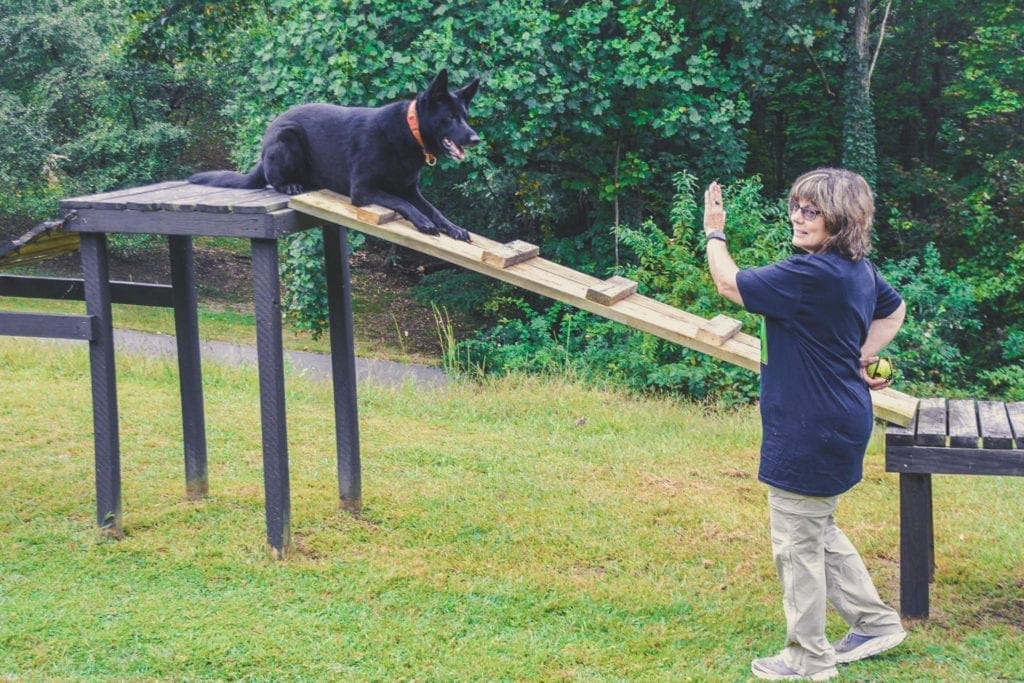MT. LIBERTY – ‘Clean and routine’ could be the tagline for Chiodo Kennels, a premier canine boarding and training facility located just outside of Philippi, West Virginia.
Located in the scenic Mt. Liberty countryside, the 22-pen boarding kennel is one-of-a-kind, says owner Kathy Chiodo, a military veteran who has more than 20 years of scent detection work with dogs in law enforcement, military and search-and-rescue settings.
Chiodo, who started the kennel and training facility in 1994, has also worked as a veterinarian technician and she’s even a certified master dog trainer.
At Chiodo Kennels, dogs who need a place to stay while their masters are away can expect to be housed in one of 22 indoor-outdoor runs that allow them to move back-and-forth as they please. The kennel has another big benefit as well — the ever-watchful presence of Chiodo.
“The boarding kennel’s attached to my house,” she said. “I’m the only business I know of in the state that operates this way – where it’s connected to the house, where I’m in and out starting at 5 a.m. and last call’s at 8 p.m.”
Probably the most attractive asset Chiodo Kennels offers its four-footed, furry guests is a half-acre exercise yard, complete with small igloo-shaped shelters should rain or snow begin to fall as dogs are frolicking in the open-air area.
“The exercise yard, to me, is the best feature because a lot of kennels don’t have that,” Chiodo said. “They might have a tiny little patch they can go out in, but it’s nothing like having trees and being able to run and move around and be a dog. It’s a safe place.”

Of course, not every resident-dog exercises simultaneously. Under Chiodo’s careful eye, each canine is paired with another dog who she thinks would make a compatible playmate.
“I match dogs up, or I just let them go out by themselves,” she explained. “It alleviates all the stress that’s involved in boarding. Boarding can be stressful for dogs; they’re away from their pack, their family. Once they get out and smell around, it activates that part of their brain that lets them be dogs and calm down again instead of being stressed.”
“I very seldom have dogs that have stress [symptoms], and believe me, I’ve worked at other kennels, I’ve worked for vets, and there’s a lot of stress for dogs that stay at those places,” Chiodo added.
Having the kennel connected to her home also allows Chiodo to monitor her boarders closely, and in some instances she’s even caught early stage medical problems before they progressed to a more critical state.
“We have a camera, so I can check on them,” she said. “They’re not just put away somewhere.”
Chiodo says although cleaning might sound like run-of-the-mill grunt work, it’s crucial to maintaining the health of her residents. She estimates 90 percent of the work involved in running a successful boarding kennel is cleaning to prevent respiratory infections and other diseases from spreading.
The heated floors are clean and the air is fresh, she said.
“My kennels have airflow from fans that are in the ceiling and fans that are at either end, so that means that the air is being completely exchanged once every three minutes,” Chiodo said.
Opening her own kennel seemed like the next natural step as Chiodo’s career evolved.
“I’ve always had dogs,” she said. “My grandfather had rabbit-hunting dogs, and I went to the military and worked with K-9 officers in the military. Then when I got out, it has just been a lifelong passion. I had actually been working in the medical field when I decided to try then to open my own business.”
“By that time, I had been through two different schools for training dogs,” she added. “I had done a lot of training on my own, and then search-and-rescue training, so I jumped in and opened this business as a boarding and training facility.”
When she served in the military, Chiodo worked with K-9 officers to patrol military bases and detect explosives. Still today, she breeds and raises working dogs, now primarily German Shepherds, which are then sent to working homes.
“By working homes, I mean homes that do something with the dogs, such as search-and-rescue or law enforcement or performance homes where they’re serious competitors,” Chiodo said.

While in the military, she trained K-9 officers to locate human remains, mostly “for our soldiers and contractors that were kidnapped or killed and taken,” she explained.
Now, as a founding member of the Barbour County Search and Recovery Team, Chiodo and her trained dogs participate in 20-30 search-and-rescue missions per year in West Virginia and surrounding states.
She also offers more basic obedience training for dogs via five-week private lessons that heavily involve the owner.
“You learn how to build a relationship with a dog and how to build a bond with a dog,” Chiodo said. “It’s just basic obedience such as ‘come,’ ‘sit,’ ‘heel,’ ‘stay,’ ‘down.’”
“Training dogs is not hard,” she added, “but it can be time-consuming. You have to be consistent, and you have to be fair. Being consistent means you have to do a lot of repetitive training for dogs to get it.”
Chiodo’s favorite part of training and boarding dogs is seeing them relax and become more playful as their stress levels decrease.
“The best part I like about it is just seeing dogs get to be dogs again,” she said. “A lot of people don’t train their dogs, and when you don’t train a dog, it doesn’t know its place. It’s actually stressful for a lot of dogs to not have at least some training.
“A dog needs to know where its place is in your family, and it needs to respect that, and if it’s allowed to do things like jump or nip and bite at people … it’s stressful for them. It’s not a happy life for them because they don’t know what’s expected in a situation. They need leadership.”
Maintaining a regimented schedule is also key to keeping dogs’ stress levels down when they’re away from their families.
“They learn, at this time, you go out; at this time, you come in, then you get a cookie. You go out with this other dog, that other dog’s not going to hurt you,” she said. “They learn that things are OK, and then they relax, and you’ll start seeing play behavior, and to me, that’s really cool to see.”
Chiodo Kennels maintains limited hours for drop-offs, pickups and appointment scheduling so she’s not continuously traipsing in and out of the boarding area with a new guest dog.
“For the dogs’ sake, if I’m in and out all day from 9 a.m. to 5 p.m., with other dogs, they get all excited,” she explained. “They think, ‘Is it time to go out again? Is it time to eat again?’”
Boarding a dog at Chiodo Kennels costs $20 a day or $15 if you’re a veteran.
“It’s a heck of a deal,” Chiodo said, smiling.
To schedule a reservation for your pet or request additional information, call Kathy at 304-613-2255 or email her at kcchiodo@gmail.com. Visit her website for detailed directions by clicking here.

This article was produced in partnership with Chiodo Kennels.












